
Myra here.
Every Saturday we hope to share with you our thoughts on reading and books. We thought that it would be good practice to reflect on our reading lives and our thoughts about reading in general. While on occasion, we would feature a few books in keeping with this, there would be a few posts where we will just write about our thoughts on read-alouds, libraries, reading journals, upcoming literary conferences, books that we are excited about, and just book love miscellany in general.

#DecolonizeBookshelves2022 Reading Theme
Early this year, I announced our reading theme: #DecolonizeBookshelves2022. This is due, in part, to my being inspired by reading This Is The Canon: Decolonize Your Bookshelf In 50 Books (Amazon | Book Depository) late last year. Much of my own research work and conference presentations last year also touched on anti-racist education through diverse bookshelves and decolonizing bookshelves in classrooms.
Joan Anim-Addo, Deirdre Osborne, and Kadija Sesay explained in their introduction why they decided to collaborate on creating this list of 50 books meant to decolonize one’s bookshelf:
The impetus for co-authoring this book has been to centralize fiction produced by writers of African descent, Asian descent, and Indigenous Peoples, to offer a corrective to reverse the dominance of white-dominant literary canons. (p. 4)
This is similar to what I also shared in my conference presentations as can be seen in the image below:

Over the past years, GatheringBooks has been strongly committed to surfacing diverse narratives, stories of and by marginalized individuals, and multicultural books. Yet, despite efforts from the publishing community, librarians, educational sector, there is still much that needs to be done, as can be seen in one of the slides I shared in my conference presentations below:

In This Is The Canon, the authors defined decolonizing in this manner, and the limits to actualizing this process:
Decolonizing can be defined literally in relation to the imperial-colonial legacy derived from empires. As will be further examined, it is a dismantling of the oppressive hierarchical power relations that, in the example of nearly four centuries of the British Empire, left hardly any region of the world untouched by its reach. A crucial limit to our work here is the availability of texts. There is a whole body of wonderful work yet to be translated into English. The issue of translation is a pressing one. This frequently connects back to the colonial legacies of contemporary writers’ contexts. (p. 8)
This issue is precisely the reason why we devoted one entire year to featuring translated / international literature (see our Year of International Literature #ReadIntlLit2020 here).
I have also been noticing a measure of discomfort and uneasiness among some of my colleagues in the usage of the phrase “decolonization of bookshelves.” As one eminent colleague noted: Why? Is our bookshelf or our curriculum colonized? There seems to be a preference to simply use the word diversify one’s bookshelf – or talk about difficult topics in children’s literature, for example – or echo the #WeNeedDiverseBooks campaign, as decolonization seems to imply something socio-political that most academics tend to avoid.
In my own research and academic work, however, I find that the gradual yet steady move towards acknowledging this decolonization of one’s bookshelf is a natural step forward from discussions on multicultural literature and deepening the discourse further by acknowledging that there are unexamined practices in library collection and book acquisition and publication that need to be explicitly addressed.

Thus, while we are pretty much doing what we have already been doing over the past years: highlighting silenced voices, featuring international/ translated/ multicultural literature – we are interrogating this further, and framing it from the lens of decolonization which is a necessary step towards dismantling oppressive structures that have been so firmly entrenched and embedded within the larger system that it seems matter of course that they have always been there.
Among the 50 books that Anim-Addo, Osborne, and Sesay featured in This Is The Canon, I have only read six – some I have featured here at GatheringBooks:
Wide Sargasso Sea by Jean Rhys [Amazon | Book Depository]
The Color Purple by Alice Walker (Amazon | Book Depository)
The God Of Small Things by Arundhati Roy (Amazon | Book Depository)
Half Of A Yellow Sun by Chimamanda Ngozi Adichie (Amazon | Book Depository)
The Kite Runner by Khaled Hosseini (Amazon | Book Depository)
Beloved by Toni Morrison (Amazon | Book Depository)
Since the authors also included a text-set of similar titles at the end of their review of each book, I would most likely hunt down some of those so that I can complete all fifty titles. My target, at least for 2022, is to read around 25 books from their list.
There are six books listed in This Is The Canon that I dutifully pulled out from my dusty bookshelves to finally read this year (cross fingers, good intentions still count for something, I believe):

The Sellout by Paul Beatty (Amazon | Book Depository)
The Bridge Of Beyond by Simone Schwarz-Bart (Amazon | Book Depository)

In Other Rooms, Other Wonders by Daniyal Mueenuddin (Amazon | Book Depository)
The White Tiger by Aravind Adiga (Amazon | Book Depository)

A Brief History Of Seven Killings by Marlon James (Amazon | Book Depository)
Things Fall Apart by Chinua Achebe (Amazon | Book Depository)
I also got a few titles from This Is The Canon via Amazon while I was in the US as part of my Christmas book haul (see here). Evidently, it is going to be a busy reading year ahead of me.
How about you? Would you care to join our #DecolonizeBookshelves2022 reading theme?
January 22, 2022 at 06:31AM Myra Garces-Bacsal








